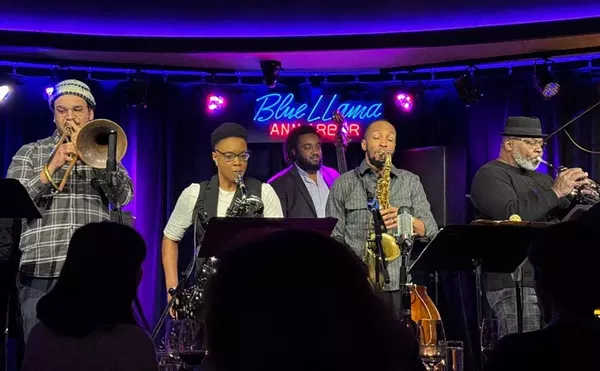Ten years ago, as most of us watched an au naturel Dennis Rodman do the “Hammer Time” dance all the way to the NBA Finals, a select few enlightened Windsor-Detroit artists-to-be were consumed by a much more interesting phenomenon. Plus 8’s Richie Hawtin and Kenny Larkin were two such individuals, cruising D-town’s pothole-laden streets, studiously listening to Jeff Mills tapes in anticipation of the day when they themselves might get close enough to ambush our ears.
DJing at the Shelter on weekends, Hawtin dreamed of becoming a bigger part of the emerging Detroit techno scene. It wasn’t long before he would realize that Detroit techno had compelled him to make his own music.
Upon befriending John Acquaviva — a veteran DJ from London, Ontario — Hawtin sensed a common artistic destiny between them as he toured John’s home studio. Without hesitation, they began making tracks feverishly and, with the help of Acquaviva’s credit card, Plus 8 Records was born next to the washing machine in John’s parents’ house. Referring to the preferred high-speed pitch control setting of their turntables during the majority of their DJ sets, Plus 8 was a name that indicated a desire to move faster and more boldly into the future. Hawtin explains:
“Plus 8 was the perfect name. It was always about the next record, the next sound, the next rhythm, and because of that, Plus 8 was always very diverse. We were interested in embracing electronic music how we thought it should be embraced — to be completely free-form. The only way we were going to come up with new ideas and to make interesting music was by having no boundaries.”
According to Hawtin, Plus 8’s foundation was built on inspiration from several fronts: “Derrick (May) and those guys — they created the blueprint,” he says, praising his influences. “When we came, a little bit after that, we saw their blueprint being sent out into the world. We were inspired by Derrick, Juan (Atkins) and Kevin (Saunderson), and by the Detroit records in one ear, but in the other ear, we were starting to hear reverberations of what they were doing from overseas. We wanted to take that inspiration and show it to the world. What Plus 8 evolved into was a label that tried to show a worldwide perspective of techno … We had people from Belgium, England and Holland, who, like us, had been inspired by Detroit, but had taken it somewhere else.”
Refusing to accept that electronic releases should fit neatly within one subgenre or another, Plus 8 pushed its artists to release full-length albums that were recorded fluidly, as cohesive works — not merely compilation albums, as had been the default standard for most electronic recordings of the time. Albums such as Musik (Plastikman), Spatial Specific (Legions of Green Men), Ginger (Speedy J) and Themes From Vapourspace (Vapourspace) characterized Plus 8’s departure from the lagging pack of early- to mid-’90s electronic labels.
“Plus 8 was predictably unpredictable,” says Acquaviva when asked about the label’s apparent commitment to variety. “If we had hits — unlike other people who would always strive for that pop culture ring — after we made a hit, we didn’t repeat it over and over. In pop culture, you fight your way to the top and once you’re at the top, you milk it for what it’s worth as long as you can, doin’ the same old shit — that didn’t motivate us.”
In addition to its critical role as an innovative record label, Plus 8 can also trace its fame to another, equally significant component. Being responsible for some of the best raves in Detroit’s collective memory is a responsibility and an honor that Plus 8, and especially Richie Hawtin, have never taken lightly. Similar to his handling of the conceptual aspects of the record label, Hawtin has remained steadfast to his commitment to a music-above-hype aesthetic for their parties. Speaking about Plus 8’s past events, Hawtin explains what separated them from the rest:
“Our parties were a complete reaction against what was going on in America at that point. I was traveling quite a bit in Europe at that time and I was seeing that there were these big raves, but also these cool underground clubs happening where the main focus was just on the music — none of these glitzy, big flower decorations, a hundred billion telebeams and all this shit … no big, stupid fliers — just pure music. It reminded me of Derrick’s (May) club, the Music Institute on Broadway, where I used to go when I was 18. It was a strobe light, a system and the most intense musical experience you could ever have. That’s what I felt was missing. Rave-o-rama was encroaching on Detroit — phat pants and full-color, foldout fliers. I thought, ‘this isn’t what we’re about; this isn’t what Detroit’s about.’ That’s why we covered everything in black plastic — to take away everything from the building so that there were no reference points. It wasn’t about the way it looked. It was a black fucking hole. We had a strobe light, a couple of other flashing lights, the best system we could afford and a DJ setup. If you couldn’t deal with the music, you got the fuck out of there. When you strip everything away and start to take control of the environment, everything becomes much, much more powerful. I wanted to create moments in time that were so intense that you couldn’t deny your memory of allocating a spot that you would remember for the rest of your life.”
When asked to preview the upcoming 10th anniversary party, “From Our Minds to Yours,” Hawtin gets diplomatic: “I don’t really like talking about things, because we’re trying to define a moment in time, we’re trying to define something so special that the participant is going to give up a memory location for it — you really don’t want any preconceptions before they walk into that door. It all has to be spontaneous and exactly for that moment.”
“Predictably unpredictable” … I don’t know about you, but I’m curious.
Robert Gorell writes about sonic adventures for the Metro Times. E-mail him at [email protected]





